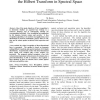120 search results - page 3 / 24 » A Survey of 3D Face Recognition Methods |
FGR
2008
IEEE
14 years 1 days ago
2008
IEEE
We describe an expression-invariant method for face recognition by fitting an identity/expression separated 3D Morphable Model to shape data. The expression model greatly improve...
JMM2
2006
13 years 5 months ago
2006
One of the main objectives of face recognition is to determine whether an acquired face belongs to a reference database and to subsequently identify the corresponding individual. F...
AVSS
2009
IEEE
14 years 12 days ago
2009
IEEE
Generative 3D face models are a powerful tool in computer vision. They provide pose and illumination invariance by modeling the space of 3D faces and the imaging process. The powe...
ICMCS
2006
IEEE
13 years 11 months ago
2006
IEEE
In this paper, we developed a family of 2D and 3D invariant features with applications to 3D human faces recognition. The main contributions of this paper are: (a) systematically ...
CVPR
2009
IEEE
14 years 12 months ago
2009
IEEE
We present a face recognition method based on sparse representation for recognizing 3D face meshes under expressions using low-level geometric features. First, to enable the applic...

